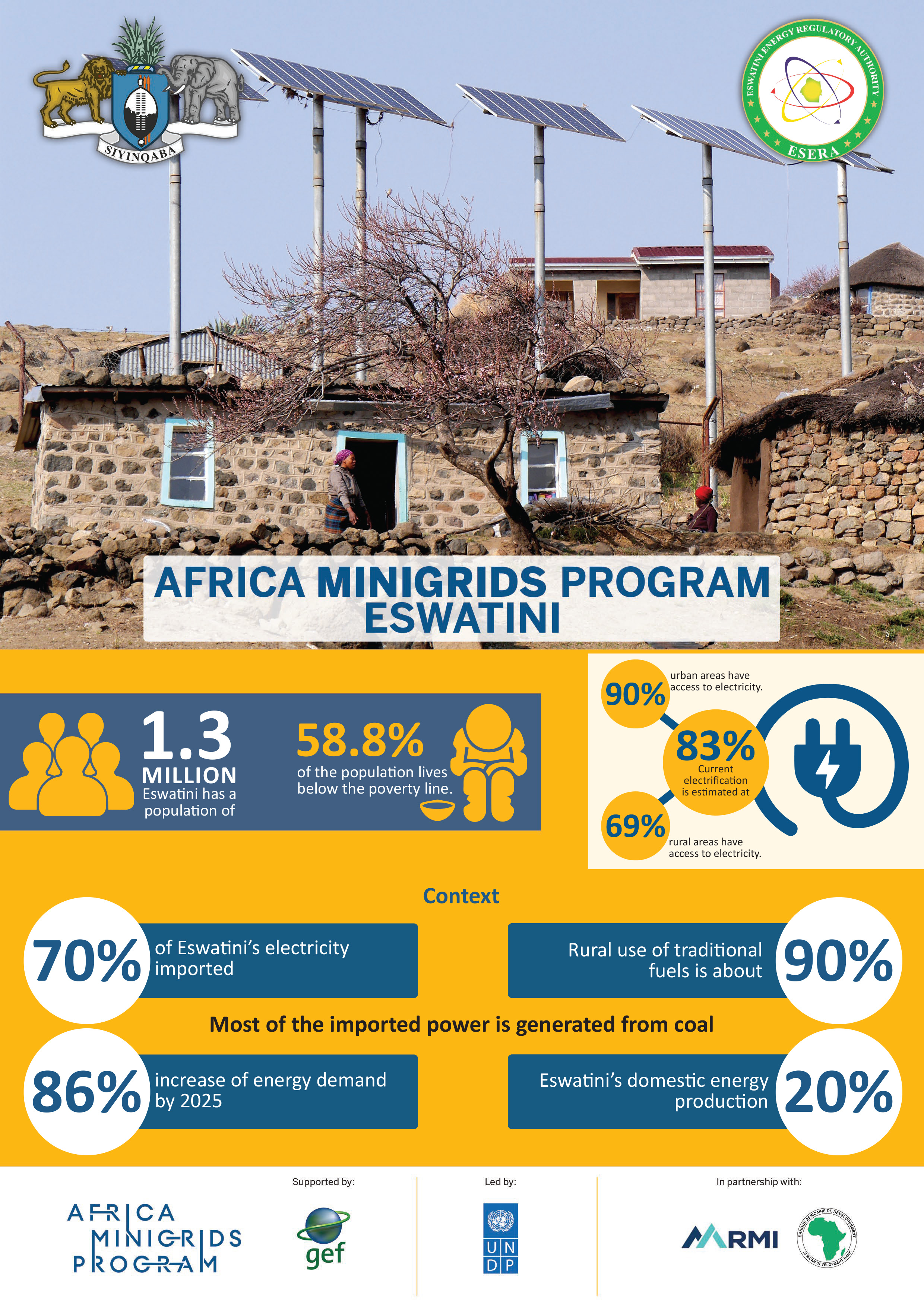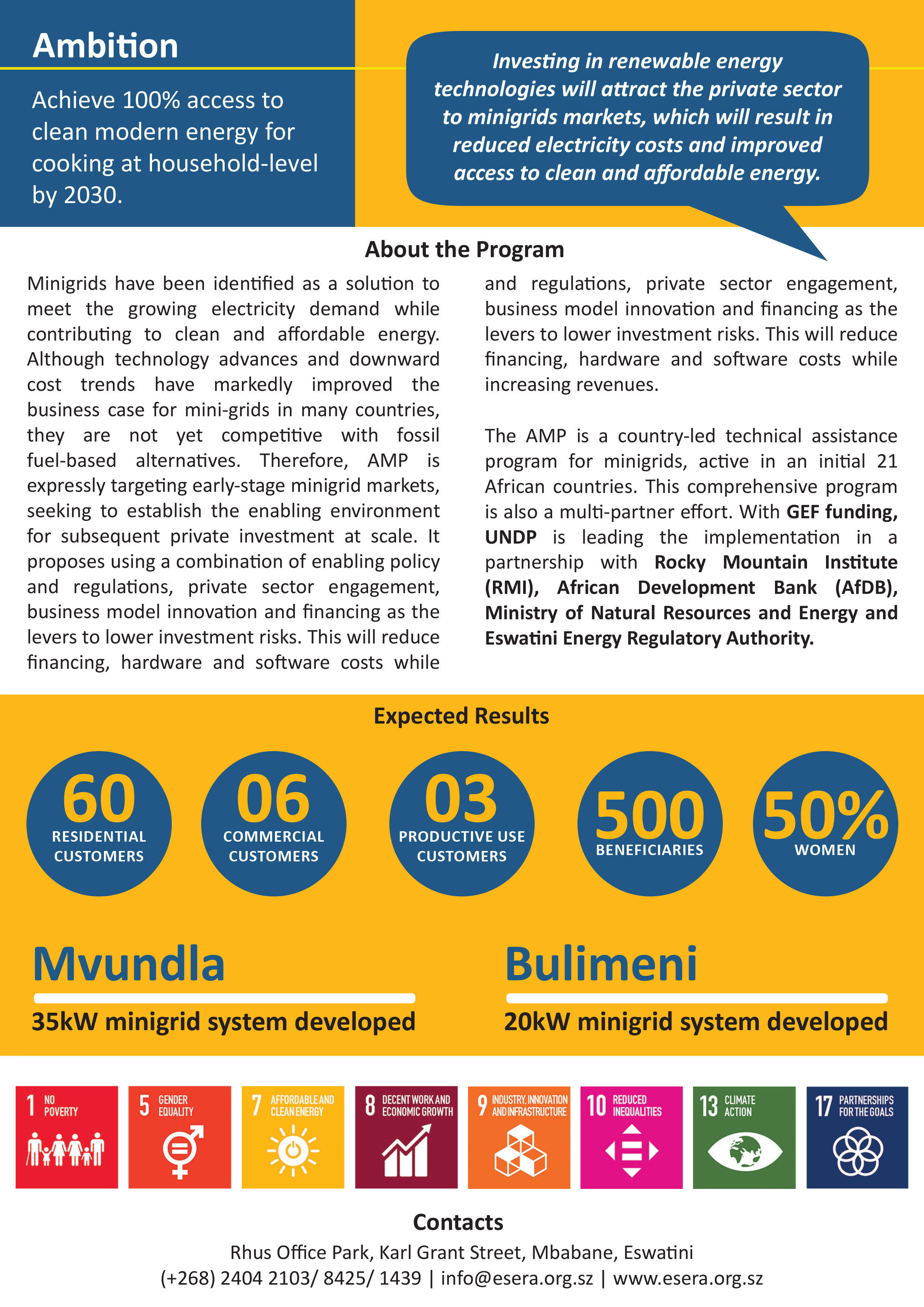Minigrids to light up rural communities
October 14, 2022
UNDP Deputy Resident Representative, Mr. Jane. O. Yeboah, (fifth from left) poses with partners at the launch of the Africa Minigrids Programme.
The acting Minister for Natural Resources and Energy, Hon. Jabulani Mabuza, launched the Africa Minigrids Program (AMP) which will enable about 500 emaSwati to access clean and affordable energy. Half of the beneficiaries from two rural communities – Bulimeni in the Shiselweni Region and Mvundla in the Manzini Region – are women.
These communities are remotely located making it difficult for the power utility, Eswatini Electricity Company (EEC), to connect them to the national grid. They are part of Eswatini’s 90% rural population that still uses traditional sources of energy such as firewood which contributes to deforestation.
Although Eswatini has a higher national electrification rate of over 80% compared to 40% for Africa, the country imports about 70% of its power from neighbouring countries. which contributes to the escalating costs making it unaffordable for poor households. Moreover, the sustainability of importing electricity, which is generated from coal, cannot be guaranteed.
Therefore, to improve energy access to remote rural communities, the Global Environment Facility (GEF) has allocated a USD 863,242 (E15,5 Million) grant to Eswatini under the AMP. Eswatini is one of the 21 African countries implementing the AMP through GEF support. UNDP Eswatini is leading the implementation of the Program in partnership with Rocky Mountain Institute, the African Development Bank, the Ministry of Natural Resources and Energy (MNRE), Eswatini Energy Regulatory Authority (ESERA), and EEC. ESERA, working with different stakeholders including civil society organizations and the communities, is responsible for the daily activities of implementing the AMP.
In the first phase, the four-year Program will build upon the already developed 35-kW Solar PV system which currently supplies power to 21 homes and two churches at Mvundla by integrating a productive use of energy (PEU) component on the demand side. In its second phase, the AMP will develop an energy hub at Bulimeni for community-based small businesses like grocery shops and salons.
Although technology advances and downward cost trends have markedly improved the business case for mini-grids in many countries, they are not yet competitive with fossil fuel-based alternatives. Therefore, one of the key highlights of the AMP is that it seeks to serve as a springboard for minigrid development in Eswatini by strengthening the country’s data and knowledge resources and developing ‘proof of concept’ business models which will be the basis for future planning. This will encourage the private sector to participate in Eswatini’s renewable energy space. This Program is expected to demonstrate how minigrids can support both residential and institutional productive energy needs such as milling, irrigation, and light-manufacturing.

“The project also seeks to leverage on private sector participation where interested companies will have the opportunity to participate throughout the project value chain, ranging from setting up of the minigrids as well as establishment of the productive energy use initiatives which will have to be developed in partnership with the communities,” said Acting Minister of Natural Resources and Energy, Hon. Jabulani Mabuza.
“This Program brings many economic opportunities in renewable energy hardware and technologies, particularly for young people who are innovative, talented and hungry for opportunities. We have to consider how to leverage young talent to service the renewable energy value chain,” said UNDP Deputy Resident Representative, Ms. Jane Yeboah.
“As the beneficiary communities we’re grateful for this Program because it targeted inaccessible communities,” said Hon. Minister of Tourism and Environmental Affairs (MTEA) Moses Vilakati and Member of Parliament for Ntondozi Constituency when rendering remarks on behalf of beneficiary constituencies – Ntondozi and Nkweni Constituencies.
“We want to appreciate the hard work from the Department of Energy under the MNRE, the regulator and the power utility working with our development partner, UNDP, in doing the groundwork to ensure that we are engaging with communities and understanding the landscape in which the project will be implemented. This is very important because it ensures the integrity of the project. As a Ministry we are looking forward to having this project implemented within the integrity of the GEF and meet all the requirements and expectations of the GEF,” said Ms. Khetsiwe Khumalo who was representing the GEF Focal Point, Ms. Khangeziwe Mabuza.
“Achieving 100% electrification for Eswatini is a priority and the identification of a solution for electrifying remote areas is a milestone that we celebrate. With the development of the minigrids regulatory framework, we believe that the country will witness exponential growth in the security of electricity supply. It pleases ESERA to be one of the implementing partners of the AMP because it will go a long way in ensuring the security of electricity supply at affordable rate in the country’s remote areas. This program brings together the converging interests of the Ministry of Commerce, Industry and Trade (MCIT), Ministry of Economic Planning and Development (MEPD), Ministry of Tinkhundla Administration and Development (MTAD), MTEA, & MNRE towards the objectives of the National Energy Policy (NEP), 2018 being to (i) ensure universal access to affordable energy; (ii) enhance employment creation; (iii) ensure security of supply; (iv) stimulate Economic growth and development; and (v) ensure environmental health and sustainability. We look forward to its successful implementation as we work collaboratively with all implementing partners,” said Mr. Skhumbuzo Tsabedze, ESERA CEO.
“Statistics indicated that a significant number of rural households are now located in places that are isolated and inaccessible. So, it became important for the EEC to look at other solutions other than grid electricity,” said EEC Managing Director, Mr. Ernest Mkhonta.

About GEF
The Global Environment Facility (GEF) is a multilateral environmental fund that provides grants and blended finance for projects related to biodiversity, climate change, international waters, land degradation, persistent organic pollutants, mercury, sustainable forest management, food security, and sustainable cities in developing countries. It is the largest source of multilateral funding for biodiversity globally and distributes more than $1 billion a year on average to address inter-related environmental challenges. The GEF was established ahead of the 1992 Rio Earth Summit and includes 184 countries in partnership with international institutions, civil society organizations, and the private sector.
About UNDP
UNDP is the United Nations' lead agency on international development and works in 170 countries and territories to eradicate poverty and reduce inequality. UNDP supports countries to develop policies, leadership skills, partnering abilities, institutional capabilities, and building resilience to achieve the Sustainable Development Goals. UNDP’s work is concentrated in three focus areas; sustainable development, democratic governance and peacebuilding, and climate and disaster resilience.
About ESERA
The Eswatini Energy Regulatory Authority, ESERA, is a category A public enterprise established in terms of the Energy Act of 2007. The Authority is mandated to:
Administer the Electricity Act, 2007 (Act No.3 of 2007), with the primary and core responsibilities of exercising control over the electricity supply industry (ESI) and ensuring the security of the supply of electricity through the issuance of licences and the regulation of electricity tariffs and quality of supply and services.
Administer the Petroleum Act of 2020, through the licencing and inspection of downstream activities.
About EEC
The Eswatini Electricity Company (EEC) is a limited liability company incorporated and domiciled in the Kingdom of Swaziland. SEC was established in 1963 as a parastatal and recently started operating in a liberalized market through the Electricity Company Act (2007), The Energy Regulatory Authority Act (2007), as well as The Public Enterprises (Control and Monitoring) Act of 1989.
Media Contacts
Teclar Maphosa: Manager – Consumer and Stakeholder Management – ESERA – teclar@esera.org.sz
Mantoe Phakathi: Communication Specialist – UNDP – mantoe.phakathi@undp.org

 Locations
Locations